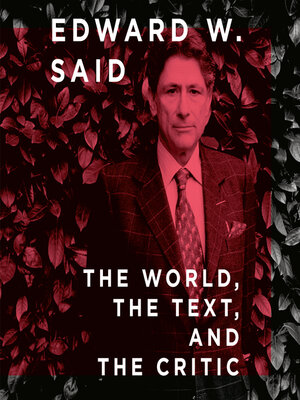
Sign up to save your library
With an OverDrive account, you can save your favorite libraries for at-a-glance information about availability. Find out more about OverDrive accounts.
Find this title in Libby, the library reading app by OverDrive.



Search for a digital library with this title
Title found at these libraries:
| Library Name | Distance |
|---|---|
| Loading... |
A sweeping and intellectually rigorous work of literary criticism that moves the field forward, from one of the preeminent public scholars
“[Said’s] book is relaxed and discursive, original, immensely learned, fluently written.”―John Bayley, The New York Times Book Review
Edward W. Said, author of Beginnings and the controversial yet seminal Orientalism, is one of the most acclaimed public intellectuals of our time. In this sweeping and rigorous work of literary criticism, he pushes the field even further forward. Moving from Derrida to Foucault, from Marxism to psychoanalysis, and from Swift to Conrad, Said argues that the dogmas of the dominant culture have crippled our engagement with literature, forcing a text to meet the requirements of theory while ignoring the tethers that bind it to the living world.
Provocatively, Said advocates for freedom of consciousness and for responsiveness to history; to the exigencies of the text; to political, social, and human values; and to the heterogeneity of human experience. The World, the Text, and the Critic asks daring questions, investigates problems of urgent significance, and gives a subtle yet powerful new meaning to the enterprise of criticism in modern society.
“[Said’s] book is relaxed and discursive, original, immensely learned, fluently written.”―John Bayley, The New York Times Book Review
Edward W. Said, author of Beginnings and the controversial yet seminal Orientalism, is one of the most acclaimed public intellectuals of our time. In this sweeping and rigorous work of literary criticism, he pushes the field even further forward. Moving from Derrida to Foucault, from Marxism to psychoanalysis, and from Swift to Conrad, Said argues that the dogmas of the dominant culture have crippled our engagement with literature, forcing a text to meet the requirements of theory while ignoring the tethers that bind it to the living world.
Provocatively, Said advocates for freedom of consciousness and for responsiveness to history; to the exigencies of the text; to political, social, and human values; and to the heterogeneity of human experience. The World, the Text, and the Critic asks daring questions, investigates problems of urgent significance, and gives a subtle yet powerful new meaning to the enterprise of criticism in modern society.







